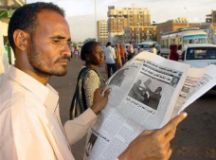Sudanese journalists say there is no more direct censorship
Feb 10, 2006 (KHARTOUM) — Nhial Bol, editor of the ‘Citizen’, an independent daily in Sudan, says working conditions for journalists in the country have improved somewhat since the signing of a historic peace deal last year.
 This agreement ended more than two decades of conflict between the Islamic government in the north, and Christian and animist rebels in the south under the leadership of the Sudan People’s Liberation Movement/Army (SPLM/A).
This agreement ended more than two decades of conflict between the Islamic government in the north, and Christian and animist rebels in the south under the leadership of the Sudan People’s Liberation Movement/Army (SPLM/A).
Since it was initialed, overt forms of censorship have been abandoned, notes Bol, who established the ‘Citizen’ in December last year. Before that, he worked for the ‘Khartoum Monitor’, the country’s largest independent English language daily. The Sudanese capital of Khartoum currently has 15 daily newspapers, mostly in Arabic.
“Since we established the ‘Citizen’, there has been no direct censorship. This is because the government wants to improve its image abroad,” Bol told IPS.
“We used to take all the pages of the newspaper to be checked by the security (agents) before going to press. We took them at nine pm, and they returned them at three am. Sometimes some of the pages were missing when (the paper was) returned,” he added.
“Sometimes they would summon you…to answer for an item they had censored, and which did not appear in the paper.”
William Ezekiel, editor of the ‘Khartoum Monitor’, agrees that direct censorship is no more.
“For the first time since we established the ‘Khartoum Monitor’, in 2000, we are working freely. Nobody comes to the office to ask for the pages of a newspaper to read before taking it to the press,” he said.
In all, the ‘Khartoum Monitor’ has been shut down four times and its license revoked twice, Ezekiel told IPS.
The paper was once rapped over the knuckles for publishing a picture of a woman’s uncovered arm, something considered indecent in the Islamic north.
Another newspaper was briefly shut down for running an advertisement by an airline calling on passengers to take advantage of the alcoholic beverages served on its flights. Alcohol has been banned in Sudan since the imposition of Islamic law, sharia, in 1983.
But while Bol welcomes the decrease in censorship, he alleges continued harassment and detention of reporters by state agents. This echoes events of earlier years, he said.
“I have been arrested and detained 38 times since 2000,” Bol noted. “As regards summons by the security agents, I have lost count of them. Sometimes they would summon me four times a day to their offices for questioning, before releasing me.”
The behaviour of security agents last month near the office of Salva Kiir – Sudan’s first vice-president, and leader of the SPLM/A — appeared to support Bol’s allegations.
This IPS reporter encountered clear hostility from agents while making his way to Kiir’s office on Jan. 28 to attend a briefing by the vice-president. Professing ignorance of the event, the officials initially refused to admit the assembled journalists.
“It’s part of the game — they are trying to frustrate us,” said Bol, exasperated. A phone call ultimately brought Kiir’s press secretary to the reception area of the building, from where he was able to usher in a number of reporters.
Southern newspapers — of which there are only three — also complain that they are still denied access to certain state offices in Khartoum.
“For example, the presidency, the Ministry of Defence, as well as the Ministry of Interior don’t invite southern journalists to their events,” said Ezekiel.
The three newspapers serve a vast community, including more than two million southerners displaced by the civil war of 1983 to 2005, who now live in shanty towns around Khartoum.
Media organisations in the East African country are controlled by a 15-member body called the National Press and Publication Council. Seven of its members are appointed by President Omar Hassan Ahmed al-Bashir, and another other seven elected from among journalists; the remaining member is a publishers’ representative.
The council has the power to shutdown, fine or revoke the licenses of newspapers viewed has having acted inappropriately. Efforts by IPS to get comment from the organisation about Bol’s claims were unsuccessful.
During its annual summit, held last month in Khartoum, the African Union (AU) rejected Sudan’s bid to lead the body because of the country’s poor human rights record in Darfur. Rebels took up arms in this western region in the early months of 2003, because of alleged neglect by government. Darfur has since been plunged into a humanitarian crisis.
The 53-member AU instead chose Denis Sassou-Nguesso of Congo-Brazzaville to head up the organisation. However, Sudan was promised the AU chairmanship next year, subject to the Darfur conflict being concluded — and media freedom promoted.
Bol’s latest run-in with Sudanese security agents came after the ‘Citizen’ published an editorial rejecting Sudan’s candidacy for the AU chairmanship.
Along with two of his journalists, Bol was initially barred from attending the summit. A huge headline splashed on the front page of the ‘Citizen’ that accused security organs of preventing it from covering the summit, later embarrassed officials into giving Bol access to the meeting.
(IPS/ST)
